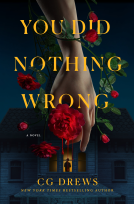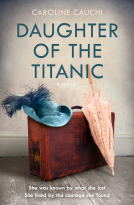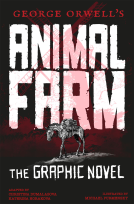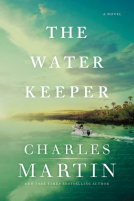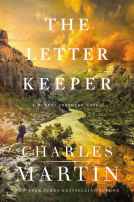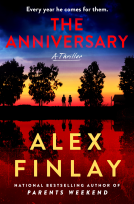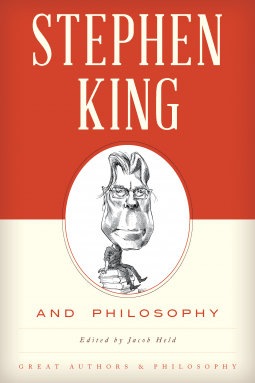
Stephen King and Philosophy
by Edited by Jacob M. Held
This title was previously available on NetGalley and is now archived.
Send NetGalley books directly to your Kindle or Kindle app
1
To read on a Kindle or Kindle app, please add kindle@netgalley.com as an approved email address to receive files in your Amazon account. Click here for step-by-step instructions.
2
Also find your Kindle email address within your Amazon account, and enter it here.
Pub Date Aug 15 2016 | Archive Date Aug 26 2016
Rowman & Littlefield | Rowman & Littlefield Trade
Description
Jacob Held has written extensively on philosophy and popular culture, having edited Dr. Seuss and Philosophy and Roald Dahl and Philosophy, coedited James Bond and Philosophy, and contributed to volumes on the Beatles, South Park, and Watchmen, to name a few. He teaches philosophy at the University of Central Arkansas and lives in Conway, Arkansas.
A Note From the Publisher
Available Editions
| EDITION | Other Format |
| ISBN | 9781442253841 |
| PRICE | $19.95 (USD) |
Links
Average rating from 34 members
Featured Reviews
I received this on a read to review basis from NetGalley. Thank you to the editor, Jacob M. Held, and the publisher, Rowman & Littlefield Publishers, for the opportunity.
This is a fascinating little insight into the philosophical issues raised and addressed in the numerous works of horror maestro, Stephen King. This brings forward the ideology that, whilst dealing with horrifying and often supernatural elements, King's writing primarily deals with the human condition. This leads to questions arising concerning the fundamental nature of knowledge, reality, and existence in the novels and dissected in this book.
This brings forward the theories and ideologies of philosophical greats like Hume, Aristotle and Plato and uses King's writing to exemplify their strategy and significance. What is left is well-rounded arguments for a variety of topics such as the existence for and against God, why we love horror, Oedipal mental dynamic repressions and the representation of femininity and sexuality.
Both the editor and King themselves argue against these horror novels as not apexing the scale of literary greatness and yet these essays provide proof of the depth and diversity of the topics touched upon. It certainly made me eager to reread King with a more academic gaze heightened with my new knowledge and perception.
The only negative (and the subsequent loss of one star) was that each essay was often littered with spoilers about the texts they were addressing. I can see no way the editor could have gone around this without leaving out critical information and creating a less fully-rounded argument. It did, however, ruin the few King novels I have yet to read.
 Rebecca T, Educator
Rebecca T, Educator
Stephen King and Philosophy, ed. Jacob Held: Free review copy. I particularly enjoyed the opening essay by Held and C. Taylor Sutton on the problem of evil: how could God be both omnipotent and beneficient, when there is so much suffering in the world? (If a fawn dies slowly in a forest fire with no one to see, for example, that suffering can’t educate or otherwise improve anyone else.) The author runs through a number of philosophical treatments of the issue, including the lesson of Job, and King after him: suffering just is, and if it is consistent with an all-powerful and all-good God, humans can’t comprehend why. “If we claim that we see no reason for evil, is that a claim about God or about us? Is our lack of imagination proof against God?” I particularly liked the discussion of theodicy, and the argument that free will is a good that accounts for human evil: “If I build some kind of autonomous cleaning robot, few would say that I could improve it by giving it the capability to murder, even if it is not programmed to use that capability.” [But cf. Tony Stark.] Ultimately, however, he argues that a finite, embodied existence must have suffering; a world without evil would lack the differentiation and finiteness that are conditions of specifically human consciousness. Then the argument turns Bayseian: The existence of suffering doesn’t argue for or against the existence of God because we have no idea about what the prior probabilities involved are. Instead of the problem of evil, he argues, we need a strategy to cope with suffering, because suffering isn’t an argument, “but a condition to be tolerated, and perhaps redeemed.” And that returns us to King, whose works are generally about that issue, and whose recommended strategy is to care, to struggle, even if there is no ultimate answer.
Another chapter, by Kellye Byal, covers female subjectivity in Carrie—one bad mother encourages Carrie to harm herself, while another motherly figure tries to get her to fit in, but that’s not a solution either. Another, by Katherine Allen, discusses Pet Sematary and The Tommyknockers as “bioconservative fables,” cautionary tales about trying to exceed human boundaries. “When knocking down a wall, one should first check that it is not load bearing; our limitations may frustrate us, may often cause us great suffering, but they are also central to our identity.” Another, by Greg Littman, covers The Dark Tower and the idea that Roland’s flaw is his vision of his life as a linear quest rather than a circle; if it is a circle, then the only way for him to find meaning in it is to make it meaningful. Like Sisyphus, the author suggests, one must imagine Roland happy. Another chapter, by Michael Potter and Cam Cobb, covers Apt Pupil, the need for propaganda in successful teaching, and the way that power is fluid.
Elizabeth Hornbeck treats the Overlook Hotel as a Foucauldian heterotopia—a place that challenges ordinary social arrangements and brings together elements that aren’t supposed to exist together; the hotel is particularly suited to this function because a “home” isn’t supposed to be heterotopic, but is rather one of the normative social spaces against which heterotopias are defined. Heterotopias both protect “normal” spaces from transgressive activity and provide a space for those activities to take place: it is vital that they are both isolated and penetrable by those with the right permissions, as hotels are.
Joseph Foy & Timothy Dale examine Richard Bachman’s works in which humans—particularly humans mediated by a reality-TV culture—are the real monsters, and bread and circuses pacify the masses. Drawing on Hannah Arendt, the authors suggest that repressive cultures such as those in the Bachman books use violence to break down connections between people that might otherwise lead to political change. Yet the more violence is required, the more people question or distrust or resist the power of the state. The Bachman books are not hopeful, in that they end with individual rebellion rather than a joining together. (I didn’t realize that King allowed Rage to go out of print because he didn’t want to inspire school shootings; I think it’s probably too late.)
Greg Littman addresses the ethical/artistic role of horror, comparing the attitudes of Aristotle and Plato towards fiction. “Sadism toward imaginary people hurts nobody in itself, so need not be a wicked pleasure, but if it conveys any moral lessons at all, they aren’t good ones.” Yet horror fiction can be a useful way of thinking through, for example, what we’re justified in doing in order to survive. Horror can’t just be a way of purging negative emotions, because those of us who like it don’t feel like we’ve purged ourselves; we feel that it’s affirmatively pleasurable to read, and not really because of the author’s literary skill. “[T]he more we are sucked into the story like a child down a sewer, the less literary evaluation is likely to enter our head,” and horror connoisseurs “can get a taste for really shitty art.” Instead, the author proposes, the pleasure of horror is the pleasure of exercising our imaginations—and that’s why even bad horror can be so much fun; the work supplies a basic structure and our imaginations do the rest.
Charles Bane deals with the vagaries of intertextuality, and how King now says that the film version of The Shining was bad—because it was so “cold,” with Jack being crazy from the beginning, and the book was “hot,” with Jack trying and failing to be good. But, as the author points out, King actually uses a lot of other authors’ works, in quotations (especially song lyrics). The beginning epigrams set the novel’s tone even though King didn’t write them; this same intertextuality means that Jack seems disturbed from the outset in the movie because Jack Nicholson’s presence inherently evokes One Flew Over the Cuckoo’s Nest. King added a scene in the TV adaptation of The Shining in which Jack’s ghost visits Danny and they share an intimate moment, “reminding viewers that Jack wasn’t such a bad guy after all. Why this change? Perhaps King simply wanted to revise Kubrick’s reading, or perhaps he had begun to suspect, like Kubrick, that maybe Jack wasn’t such a good guy.” Ultimately, King doesn’t have interpretive authority over The Shining, any more than anyone else does.
Paul Daniels deals with time travel and the question of linear time in The Langoliers: is time like space, in that every moment in it exists now but we’re not there, or is there something special about the present? The eternalist says “it’d be a mistake to conclude that Pluto doesn’t exist merely because it’s not here, and likewise it’d be a mistake to conclude that Julius Caesar doesn’t exist merely because 49 BCE isn’t now.” The promise that there will be only one future, only one outcome, is the way that we hold ourselves together psychologically as we move through time, and King’s implicit argument in his books that deal with time are that ordinary people can hold up against the assault of many possibilities, even horrible ones, quite well.
Randall Auxier discusses time in the Dark Tower series and other books, including UR (which was released twice, once as a Kindle Single and once in edited form as part of a collection, removing references to JFK as well as to Gore’s loss in 2000).
Finally, Held returns to the problem of evil, this time invoking Schopenhauer. As he points out, King’s characters always face a choice: run (or drink), or fight against evil. There’s no ultimate victory, and no God-given goal. King’s children in particular suffer intensely, and often without hope of rescue, which is King’s view of our shared condition. But if suffering is inevitable, then Schopenhauer says that the best life is a heroic life, “struggling against overwhelming odds in some way and some affair that will benefit the whole of mankind,” even if they don’t reach their reward. And this struggle can be extending compassion to just one person who needs it. As King writes, “One kid doesn’t matter—not in the face of this… It was logical, but it was croupier’s logic. Ultimately, killer logic … The kid matters or nothing matters.”
 simona t, Educator
simona t, Educator
Like every volume in which philosophy investigates pop and pop tells philosophy, even this collection of short papers dedicated to Stephen King has some good moments - very good, indeed - and his lame ones, but in the whole is quite an interesting reading, it's a book that make you wish for reading more - or again - King's novels.
Does the problem of evil prove there is no God? Can we read "Carrie" as a novel about the construction of a female subject according to the cathegories of de Beauvoir's "The Second Sex"? Is there a philosophical disputal between transhumanism and bioconservatism - a disputal won by the latter - in King's horror novel like "Pet Cemetery"? Would Roland be horrified by Nietzsche's prospect of eternal recurrence? And is he a follower of the utilitarian ethics? Can "Different Season" be analyzed according to Aristotle's kind of friendship? Is the Overlock Hotel "The Shining" like a Foucault's heterotopia? Are "The Running Man" and "The Long Walk" dystopian novels which show Arendt's perspectives on power and violence? And yet, Schopenhauer's compassion in horror genre, time travel, foreknowledge, and more philosophical mortal questions. What a great book.
A very thorough and in-depth look at some of King's writings, including a lot of his earlier novels. It's a little bit of a difficult read (it is based on philosophy after all), and Held occasionally goes off on tangents with other authors, quotes, and books, but it is an intriguing view on some of King's greatest works. I'm an avid reader of King, but not of philosophy, so I think the reader must be interested in both to thoroughly enjoy the finer points of this book.
Many have commented on the spoiler aspect of the analysis for each book, but I'm thinking that the target audience for this selection is those who have already read most of King's books and enjoyed them. I don't really see a newbie buying this before having a vested interest in King.
This is the first in Held's philosophy series, and I think it is interesting he chose King. Something Stephen King has said (and written, as in 11/22/63) has always resonated with me - "Sometimes a story is just a story". I really loved this about King as I think fantastic literature can be written to be enjoyable and not always as an allegory or statement that one must analyze. King himself has stated that Tommyknockers is trash and his least favorite novel that he has written, but Held has put forth his philosophical viewpoint anyway. This is why a star has been taken off - while many valid points have been presented, I feel like with King it is possibly over-analyzed a tad. My question is did King write these books with such intent on the philosophical side? Maybe in some (such as The Dark Tower series) but I'm not quite sure on others.
 Carol C, Reviewer
Carol C, Reviewer
I love Stephen King's books and have always felt he doesn't get the credit he deserves for excellent writing because of his popularity. But there's no rule that says a book - or author - can't be excellent AND popular. This book delves into a deeper study of King's work. It's an interesting book
I received an ARC in exchange for my honest review
 Earl M, Reviewer
Earl M, Reviewer
Stephen King and Philosophy, edited by Jacob M Held, is a collection of essays focusing on philosophical readings of many of King's works. While this is somewhat academic in style the essays are accessible and concepts, as used by the writers, are explained adequately.
Like any book about an author's work, there are so-called spoilers. If you haven't read the works under discussion then the essays can only be read passively since one doesn't have a frame of reference to decide if the argument, to them, is valid. So this isn't really for people who haven't read some or most of King's work. I only bring this up because I saw someone who counted that as a negative when no book with which I am familiar that seriously tackles an author's work does so without substantiating their points with the author's text. I was surprised at the "criticism" of this work on that basis.
I did not find every argument equally convincing but that is to be expected. That said, I did not feel any essay went too far afield in their commentary, my differences tended to be one of degree. King's appeal has long been the human element, more precisely the element of human flaws, and how that can lead to catastrophe or at least extreme negative consequences. It is in the matching of this dynamic, flaws leading to consequences, to philosophical ideas where this book excels.
For those without a philosophy background, I think the essays present the philosophy parts of their assessments in fairly plain language, so don't be too concerned about that. It might require some pauses to make sure you are following the writer but you will be able to get through it. For those with a philosophy background, as you well know, there is always more left unsaid about a given philosopher's thought than is said, so try not to overly nitpick because a writer didn't use what you would have used given the same assignment. Unless you feel what was said was either wrong or misused it is nothing more than a different approach.
I would certainly recommend this to any Stephen King fan who likes to ponder a work after reading it. Educators will find this useful for both teaching King in the future and for ways to approach other authors through a philosophical lens.
Reviewed from a copy made available by the publisher via NetGalley.
Readers who liked this book also liked:
Jakub Politzer (Illustrator), Christina Dumalasova (adapter), Katerina Horakova (adapter)
Comics, Graphic Novels, Manga, General Fiction (Adult)









